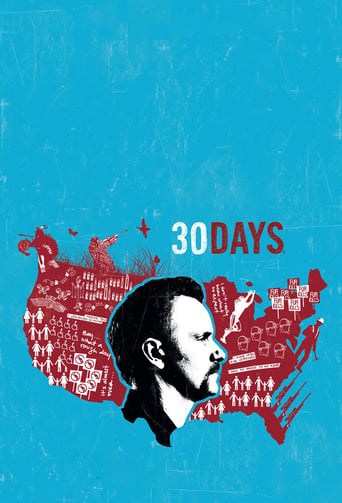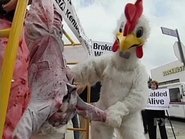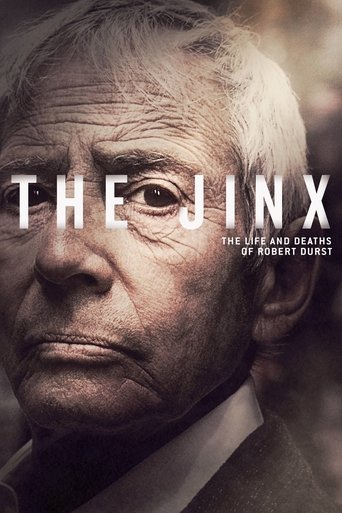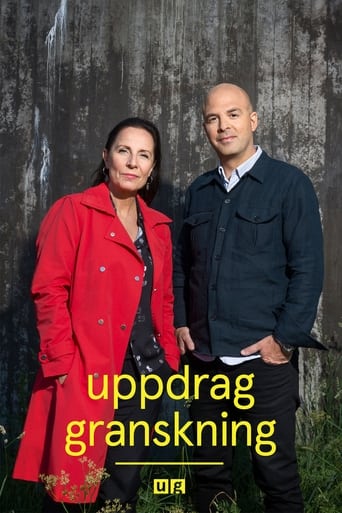
Animal Rights
George Snedeker is an avid hunter who considers it much more than just a sport; to George, hunting is a way of life. George hunts mainly for deer meat and tries to use the entire animal in order not to be wasteful. For 30 Days, George will live in Los Angeles with vegan Melissa Karpel, 29, and her vegan family: parents Don and Madeline Karpel and her sisters Stephanie and Kimberly, who are 25-year-old twins. Melissa is a Los Angeles Campaign Coordinator for the People for the Ethical Treatment of Animals (PETA), a non-profit organization that fights for animal rights on factory farms, in laboratories, in the clothing trade and in the entertainment industry. George will participate in PETA initiatives including a demonstration at a popular fast food chain, work at a local farm animal rescue center and meet with various organizations such as Last Chance for Animals, a non-profit group dedicated to animal rights.
- Morgan Spurlock
Country: US
Language: En
Runtime: 60
Season 3:

To kick off the third season of 30 Days, series creator Morgan Spurlock returns to his home state of West Virginia, to work as a rookie apprentice coalminer known as a "redhat" for 30 days. Morgan goes to Bolt, West Virginia and lives with Dale and Sandy Lusk. Dale, the supervisor of the mine where Morgan works, has mined coal for 35 years and introduces Morgan to a miner's way of life. Morgan gains an understanding of the financial benefits that draw people to coal mining, but also learns, first hand, the dangerous conditions that miners must face every day. As a new miner, Morgan is assigned much of the grunt work, including plastering, building wooden roof supports, shoveling coal and hauling heavy equipment. On his days off, Morgan leaves the mine to examine some of the bigger issues surrounding the coal industry. He meets with Peggy Cohen, 36, the daughter of a miner killed in 2006 in a Sago, West Virginia mine explosion. Morgan also talks to both coal industry executives and environmentalists about surface mining and mountain-top removal to gain perspective on the pros and cons of an industry that provides the U.S. with the raw materials for 50% of our electricity. electricity.

Ray played football for Baylor University from 1984-88 before his NFL draft in 1989. He won two Super Bowl rings in 1998 and 1999 as a starting member of the Denver Broncos. During his fourteen years in the NFL, he also played for the Detroit Lions and the Kansas City Chiefs. Today, Ray and his wife April have three children, a 20-year old daughter named Joi and two sons, 13-year-old Ray Junior and seven year old Darryl. Ray now works as a real estate developer and coaches his older son Ray Junior. In 1991, Ray was on the field with the Detroit Lions when his teammate and friend, Mike Utley, was involved in a play that left him paralyzed from the chest down - an event that has not dissipated from Ray's memory. In fact, it is this incident that made Ray want to participate in 30 Days. For 30 Days, Ray will live in a wheelchair and will rely on his mental discipline to keep his legs immobile. His home and his car will be retrofitted to accommodate his needs. Coaching duties for his son's football team will continue and Ray will join the Texas Stampede, the wheelchair rugby team featuring players made famous in the documentary film Murderball. He will attend a weekly support group for paraplegics at the Baylor Institute of Rehabilitation and meet with a physical therapist to monitor any potential side effects. Throughout his 30 Days experience, Ray will be under the medical supervision of Dr. Robert Bruce in order to track any muscle loss, blood clots, pressure sores or other side effects that could occur while he is wheelchair-bound.

George Snedeker is an avid hunter who considers it much more than just a sport; to George, hunting is a way of life. George hunts mainly for deer meat and tries to use the entire animal in order not to be wasteful. For 30 Days, George will live in Los Angeles with vegan Melissa Karpel, 29, and her vegan family: parents Don and Madeline Karpel and her sisters Stephanie and Kimberly, who are 25-year-old twins. Melissa is a Los Angeles Campaign Coordinator for the People for the Ethical Treatment of Animals (PETA), a non-profit organization that fights for animal rights on factory farms, in laboratories, in the clothing trade and in the entertainment industry. George will participate in PETA initiatives including a demonstration at a popular fast food chain, work at a local farm animal rescue center and meet with various organizations such as Last Chance for Animals, a non-profit group dedicated to animal rights.

Kati believes that children should be raised by a mother and a father and not by same-sex parents. As the mother of two adopted sons Kati believes that she has ample experience to determine what kind of environment is conducive to healthy, successful adoptions. In fact, Kati was adopted as an infant herself. For 30 Days, Kati will live in Ypsilanti, Michigan with domestic partners Dennis and Thomas Patrick and their four adopted sons: Josh, 11; Paul, 8; Joey, 8; and Raul, 6. The Patrick's have been together for 10 years, and in 2001, Thomas legally changed his last name to Patrick. Kati will attend church with the family, help the boys get ready for school each morning and talk candidly about her views on parenting and gay adoption as she observes how the Patrick's parent their boys. Kati will volunteer and travel to the state capitol with the Coalition for Adoption Rights Equality (CARE), a children's advocacy group lobbying for legislation to legalize dual-parenting rights for same-gender couples. She will socialize with women from the Lesbian Mom's Network, a group that connects lesbian mothers and their children with families like their own. She will also meet with former foster children who talk about what it's like to grow up without parents or a permanent home and the need for more foster parents.

After Pia learned that her friend had been killed by a schizophrenic man wielding a gun in 1996, she became a gun control advocate who has fought to pass stricter gun laws in the U.S. Pia believes that the world would be free from gun violence only by prohibiting the sale of guns to anyone outside of law enforcement and armed services. For 30 Days, Pia will live in the heart of gun culture in the rural town of Leesburg, Ohio with gun enthusiast Ken Ekermeyer, 39, and his 15-year-old son Zach. Ken is an avid gun collector and rarely leaves home without his gun strapped to his side. Ken believes carrying a gun is his right guaranteed to every American by the Second Amendment. As Pia struggles to understand the Ekermeyer's beliefs and somewhat isolated way of life, she will work at a local gun store and experience what it is like to carry a gun in public, learn to handle and fire weapons and will introduce Ken to other gun control activists who have lost loved ones to gun violence.

Series creator Morgan Spurlock returns for his second installment this season to discover what life is like for America's most indigenous people: Native Americans. As he heads west to Navajo Nation near Window Rock, New Mexico, Morgan will realize just how little he knows about the issues facing this tribal culture. For 30 Days, Morgan will live with Deborah and Karl Dennison and their children: son Kyle, 25 and daughter Cassidy, 15. Deborah holds a PhD in education and is the superintendent of the Ganado School District; Karl is a physical education teacher at the tribal Dine College and is a renowned rodeo competitor. Despite living on a remote desert ranch, the Dennison family has many of the conveniences of the modern world, yet make great efforts to preserve the ancient traditions and culture of their ancestors. While on the reservation, Morgan will live in a traditional Navajo dwelling called a Hogan, work at a tire shop and spend several grueling hours in a sweat lodge as part of a "Coyote Ceremony." He will also experience the economic hardships and social crises that are common to reservation life while exploring many misconceptions about Native Americans.






















